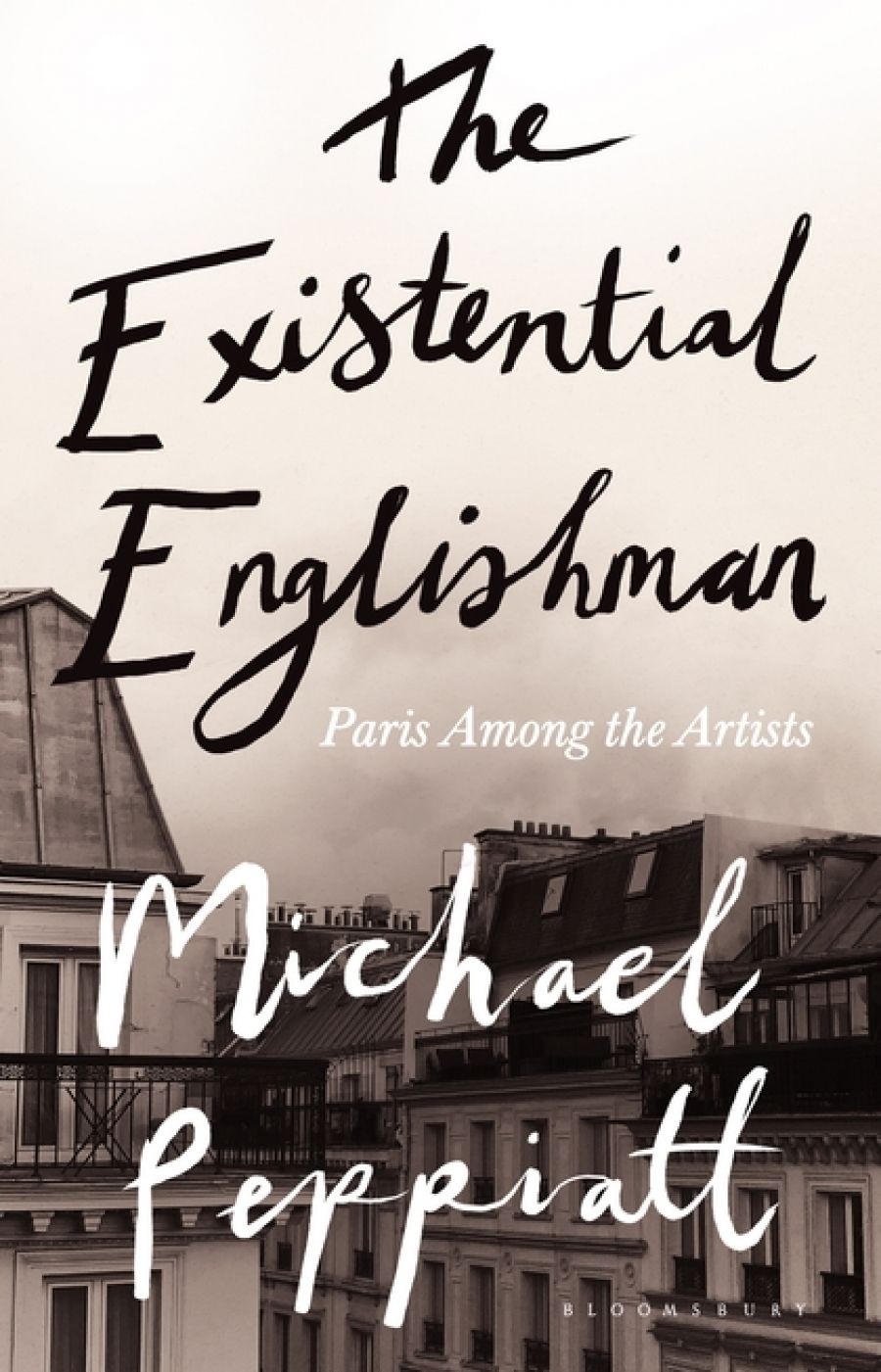
- Free Article: No
- Contents Category: Memoir
- Review Article: Yes
- Online Only: No
- Custom Highlight Text:
I wanted to like this memoir very much, not least because the inside of the book jacket promises, with some originality, a ‘not-uncritical love letter to Paris’. People (myself included) have a tendency to wax rhapsodic about France’s capital, but anyone who has ever lived there for any length of time knows ...
- Book 1 Title: The Existential Englishman
- Book 1 Subtitle: Paris among the artists
- Book 1 Biblio: Bloomsbury, $47.99 hb, 361 pp, 9781408891711
Already a close friend of painter Francis Bacon – the subject of several of the author’s previous books – Peppiatt’s work in Paris brings him into contact with artists from all over the world. He accompanies them to buy pastels, witnesses their feuds, and joins them in bar-hopping, yet seems to remain at the periphery of the art world, noting ‘this is probably the role I fulfil best: getting into secret spaces and unusual situations, without any real credentials or involvement, just being there, observing, noting things down’. This changes only partially when he takes over the magazine Art International, an all-consuming and ultimately unsuccessful endeavour.
 Michael Peppiatt with Francis Bacon in David Hockney’s studio in Paris, 1975 (photograph via Michael Peppiatt website)
Michael Peppiatt with Francis Bacon in David Hockney’s studio in Paris, 1975 (photograph via Michael Peppiatt website)
Consequently, this is less a memoir about art than a memoir about the various existential crises Peppiatt experiences throughout his Parisian decades. The worst, triggered in true 1960s style by a particularly potent joint, plays havoc with his sanity. Others occur around work, love affairs, even food, where the contrast between his meals in local neighbourhood cafes and Bacon-funded extravaganzas at the Tour d’Argent and Ritz seem to have caused him some unease. He struggles most of all with writing. In each of his Parisian abodes, Peppiatt finds himself ready, with nails clipped, beard trimmed, and typewriter cleaned, to produce a great literary work. It never eventuates. He is, he later realises, a victim of perfectionism, both in language – ‘I wanted to be seen as incapable of a graceless line’ (a concern evident in the book’s more overwritten passages) – and in choosing a subject. Writing about Bacon eventually leads him to conclude that his real interest lies in fact rather than fiction.
Like any good raconteur, Peppiatt has an arsenal of interesting facts, stories, and anecdotes ready for replay. He remembers the construction of the Centre Pompidou and the opening of the Musée d’Orsay, knows the buildings of the Marais inside out, and shares his enthusiasm for the game of jeu de paume (real tennis). Like any good raconteur, he is also perhaps slightly too fond of the sound of his own voice: we hear, for example, about every famous person he has ever dined with (Catherine Deneuve), eavesdropped upon (a surprisingly tedious Marlene Dietrich), or almost but did not quite meet (Alberto Giacometti). Sharper editing could have made for a more enjoyable read.
Yet this is in itself constrained by the way Peppiatt writes about women. The preface begins with him admiring ‘some raven-haired beauty’ in the library, and later ‘a room full of exquisite adolescent ballerinas’. Chapter by chapter, it gets worse. For Peppiatt, women are ‘passing opportunities’, recalled as ‘fireside skirmishes’ or by the nicknames he bestows upon them. He may lament his ‘brute sexual drive’, but he offers little soul-searching over his incessant cheating, only disdain for those women who dare to be angry at his mistreatment of them. Several passages, wallowing in egregious detail, would make the book a shortlist certainty for the Literary Review’s Bad Sex Award were it not restricted to fiction. Add in some cringeworthy comments on homosexuality, and one wonders what the author’s editor at Bloomsbury was thinking. As it is, Peppiatt’s recorded escapades and the attitudes that enabled them stand as an unfortunate monument to mindsets past. His book will no doubt provide much material for historians of the future but probably not always in the ways intended.
Peppiatt ends the memoir in 2014 when, after a spell in London, he and his wife (yes, he finally marries) decide to return to Paris. There he finds that the city has suffered its own existential crisis: ‘how brutally downgraded, how lacking in identity and purpose this Paris appears compared with the Paris I encountered half a century ago’. He wonders if the ‘show of innate superiority’ before which he used to cower was ‘an instinctive cover-up for the void that was to come’, seeing a city that, even then, was living off its former glory. Things were ever, it seems for some, better in the past.


Comments powered by CComment